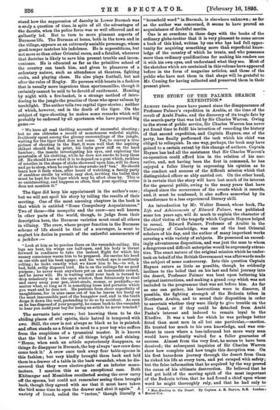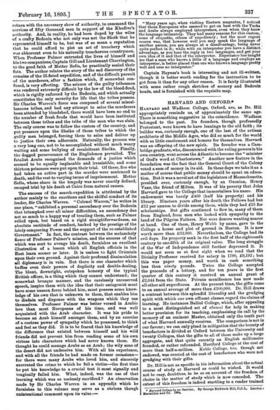THE STORY OF THE PALMER SEARCH EXPEDITION.* ALMOST twelve years
have passed since the disappearance of Professor Palmer's expedition in Arabia, at the time of the revolt of Arabi Pasha, and the discovery of its tragic fate by the search-party that was led by Sir Charles Warren. Owing to the stress of public service, Sir Charles Warren has never yet found time to fulfil his intention of recording the history of that second expedition, and Captain Haynes, one of the party, has finally performed the task which his chief was obliged to relinquish. In one way, perhaps, the book may have gained to a certain extent by this change of authors. Captain Haynes has had all the assistance that Sir Charles Warren's co-operation could afford him in the relation of his nar- rative, and, not having been the first in command, he has enjoyed a fuller liberty in expressing his opinion as to the conduct and success of the difficult mission which that distinguished officer so ably carried out. On the other hand, it is certain that the story will have lost much of its interest for the general public, owing to the many years that have elapsed since the occurrence of the events which it records, and, it must be confessed, it also suffers somewhat by its transference to a less experienced literary skill.
An introduction by Mr. Walter Besant, whose book, The Life and Achievements of Edward Palmer, was published some ten years ago, will do much to explain the character of the chief victim of the tragedy which Captain Haynes helped to reveal. Edward Palmer, Professor of Arabic in the University of Cambridge, was one of the best Oriental scholars of his day, and the author of many important works covering a wide variety of subjects. He possessed an exceed- ingly adventurous disposition, and was just the man to whom a dangerous and difficult enterprise would be supremely attrac- tive. The exact nature of the original mission which he under- took on behalf of the British Government was afterwards made the subject of some controversy. Into this question Captain Haynes enters as little as possible, though he evidently inclines to the belief that on his last and fatal journey into the desert, Professor Palmer was bent upon bettering his original instructions, and making a grand coup which was not included in the programme that was set before him. As far as one can gather, his instructions were to discover, if possible, the fighting strength of the Bedouin tribes in Northern Arabia, and to sound their disposition in order to ascertain whether they were likely to give trouble on the Suez Canal, or if they could be detached from Arabi Pasha's interest and induced to remain loyal to the Khedive. It was a task for which he was perhaps better fitted than most men in all but one particular,—caution. He trusted too much to his own knowledge, and was con- fident in cases where a less-informed but more wary man would have prudently waited for a fuller guarantee of success. Almost from the very first, he seems to have been deceived; the subsequent inquiries of Sir Charles Warren show how complete and how tragic this deception was. On his first hazardous journey through the desert from Gaza he risked his life at every turn, and yet escaped with safety; but the false information that he acquired by the way proved the cause of his ultimate destruction. He believed that he had got hold of the moving spirit of the most important of the Bedouin tribes, that he had found a chief upon whose word he might thoroughly rely, and that he had only to • Man-Hunting in MI Desert. By Captain A. E. Haynas, B.K. London: Moraoe Cox. return with the necessary show of authority, to command the services of fifty thousand men in support of the Khedive's authority. And, in reality, he had been duped by the wiles of a crafty Bedouin who not only was not the Sheik that he represented himself to be, bat was of so mean a reputation that he could afford to plot an sot of treachery which was abhorrent even to his naturally treacherous countrymen. When Professor Palmer entrusted the lives of himself and his two companions, Captain Gill and Lieutenant Charrington, to the good faith of Metter Sofia, he practically sealed their fate. The author relates the story of the sad discovery of the remains of the ill-fated expedition, and of the difficult pursuit of the murderers, after a fashion which, if somewhat con- fused, is very affecting. The seizure of the guilty tribesmen was rendered extremely difficult by the law of the blood-feud, which is rigidly enforced by the Bedouin, and which actually .constitutes the only security for life that the tribes possess. Sir Charles Warren's force was composed of several miscel- laneous tribes, and had any attempt to seize the murderers been attended by bloodshed, there would have been no end to the number of fresh feuds that would have been instituted between these tribes and the tribe of the man who was slain. The only course was to follow the custom of the country, and put pressure upon the Sheiks of those tribes to which the guilty men belonged, forcing them to seize and deliver up to justice their own adherents. Naturally, the process was a very long one, not to be accomplished without much weary waiting and some bullying of recalcitrant Sheiks. Finally, the dogged perseverance of the Englishmen prevailed. The fatalist Arabs recognised the demands of a justice which seemed to be equally implacable and irresistible, and some thirteen prisoners were put upon their trial. Of these, five who had taken an active part in the murder were sentenced to death, and the rest to varying terms of imprisonment. Metter Sofia, whose share in the tragedy was never exactly defined, escaped trial by his death at Cairo from natural causes.
The success of the search-expedition is attributed by the author mainly to the exertions and the skilful conduct of its leader, Sir Charles Warren. "Colonel Warren," he writes in one place, "exhibited a personal ascendency over the Bedouin that triumphed over all minor difficulties, an ascendency due not so much to a happy way of treating them, such as Palmer relied upon, but based on a rigid straightforwardness, an absolute rectitude of conduct, backed by the prestige of the lately conquering Power and the support of the re-established Government." In fact, the contrast between the melancholy fiasco of Professor Palmer's mission, and the success of that which was sent to avenge his death, furnishes an excellent illustration of a lesson which all English officials in the East learn sooner or later. It is useless to fight Orientals upon their own ground. Against their profound dissimulation ell diplomacy is in vain. But there is one character which baffles even their powers of duplicity and double-dealing. The blunt, downright, outspoken honesty of the typical British officer, is a thing which they cannot understand; the somewhat brusque manner, and the carelessly unreserved speech, inspire them with the idea that their antagonist must have some unseen force behind him, must possess some know- ledge of his own that is unknown to them, that enables him to disdain and dispense with the weapons which they use themselves. Professor Palmer was better versed in Arabic lore than most Europeans of his time, and was well acquainted with the Arab character. It was his pride to become an Arab himself amongst them, and by an exercise of a curious power of sympathy which he possessed, to think and feel as they did. It is to be feared that his knowledge of the difference that existed between himself and his wild friends did not prevent him from reading some of his own virtues into characters which had never known them. He thought he could manage Arabs as an Arab ; the wily sons of the desert did not undeceive him. With all his experience, and with all the friends he had made on former occasions— for there were many Arabs who loved him, and sincerely execrated the crime to which he fell a victim—the first time he put his knowledge to a crucial test it most signally and tragically failed him. What, indeed, was the use of that learning which was so uselessly sacrificed ? An observation made by Sir Charles Warren in an appendix which he furnishes to this volume may serve as a curious though unintentional comment upon its value :—
" Many years ago, when visiting Eastern magnates, I noticed that those Europeans who seemed to get on best with the Turks and Arabs always employed interpreters, even when they knew , the language intimately. They had many reasons for this custom, I some of etiquette, others of expediency ; but the most cogent reason was, that however well you may speak the language of another person, you are always at a disadvantage, being never i quite perfect in it; while with an interpreter you have a distinct , advantage, as you hear the reply in two languages, and get your own idea of it and that of the interpreter. Experience has taught me that a man who knows a little of a language and employs an interpreter, is better placed than one who knows a language pretty well and uses no interpreter."
Captain Haynes's book is interesting and not ill-written, though it is better worth reading for the instruction to be got from it than for any other reason. It is fairly illustrated with some rather rough sketches of scenery and Bedouin heads, and is furnished with the requisite map.



































 Previous page
Previous page